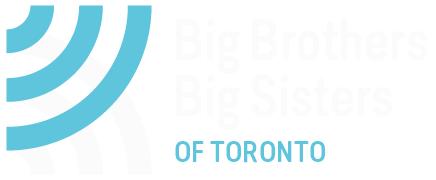Young people have been deeply affected by COVID-19 restrictions and youth mentorship offers the support they need to manage the current situation, and mitigate the effects of it for years to come.
The effects felt due to the closure of schools and the social isolation in children and youth in Toronto who face adversity highlights the importance of a placing a Big in their lives. Research shows that placing a caring adult in the life of a child has the power to mitigate toxic stress,* which is caused by adverse experiences such as the COVID-19 pandemic.
The need for Bigs during the pandemic has increased. Fifty-four per cent of youth between the ages of 6 and 18–years–old claimed that they want a mentor, but don’t have access to one.**
The lack of access is extremely concerning given the proven impact a Big has on a young person’s life. Studies have shown that having a mentor, known as a Big at BBBST, can improve a child’s mental health. The connection between a Big and a Little has been proven to lower anxiety, increase confidence, and improve one’s ability to thrive and manage the current situation better.*** This is especially important considering the current challenges children and youth face in navigating the pandemic.
Youth in Canada have reported higher levels of stress, anxiety, and worry due to the ongoing pandemic. They’ve expressed concerns about loneliness, the health of their loved ones, and finances. Among other concerns youth have expressed a difficulty in accessing education and support systems. Youth are now less likely to describe their lives as “good or really good.” There has also been an eight per cent decrease in youth who describe their mental health as “good or excellent.”****
Youth living in neighbourhood improvement areas in Toronto have the highest rates of suicide, self-harm, and acute mental health challenges, making it extremely important to provide access to mentors in these communities. While BBBST has been forced to put in-person mentoring on hold throughout much of the pandemic, many programs and one-on-one mentoring has been offered virtually. Virtual mentoring programs create educational and vocational opportunities for populations who are disadvantaged or underrepresented.
These neighbourhoods in Toronto have been hit the hardest by the pandemic. Data released by the City of Toronto has shown that people living in these neighbourhoods are more likely to contract COVID-19 due to a higher transmission rate, and are also less likely to be vaccinated. Children in these communities are less likely to have any sources of role-modelling, high-quality ties, mentorship opportunity, and career advice.
Providing mentorship opportunities to these communities is critical in Toronto’s COVID-19 response. With a growing demand for support services in the city due to the pandemic, formal mentoring programs are a necessary part of the continuum of care between professional care and informal support or natural mentoring.
Our programs are a critical part of the acute response to the pandemic. BBBST provides youth with access to mentoring relationships when they need them most while actively mitigating some of the negative social effects of COVID-19 in Toronto’s youth for years to come.
Asking mentors to support children and adolescents during the pandemic will have positive outcomes and economic benefits for years to come. In 2013 the Boston Consulting Group prepared a study that calculated the social return on investment created from a donation to Big Brothers Big Sisters programs. The value of investing in youth indicated a return of $23 to society for every $1 donated.
BBBST programs support young people’s mental health during the pandemic, and will play a significant supporting role in supporting youth to navigate the challenges they face post-pandemic for years to come.
While BBBST continues to serve families and youth in Toronto throughout the pandemic, there are many families and youth who need support for a variety of challenges including their mental health. If you, your Little, or someone you know is experiencing difficulties with their mental health, please see below for a list of resources to help:
- https://kidshelpphone.ca/
- https://apps.kidshelpphone.ca/resourcesaroundme/welcome.html?_ga=2.222774555.182854873.1620320871-629763925.1620073553
- https://toronto.cmha.ca/youth-zone/
- https://ctys.org/
- https://cmho.org/
- https://stridestoronto.ca/
Sources:
*https://www.cdc.gov/violenceprevention/aces/help-youth-at-risk.html
**State of Mentoring: National Youth Mentoring Survey by Mentor Canada
***Smith D & Johnson W, 2020. Social Distancing doesn’t have to disrupt Mentorship. Emotional Intelligence. Harvard Business Review Available from: https://hbr.org/2020/04/social-distancing-doesnt-have-to-disrupt-mentorship
****Oksana Kishchuk, 2020. COVID 19 & Canadian Youth: Impacts, Perspectives & The Recovery. Abacus Data
